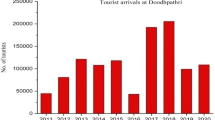Abstract
Tourism industry is recognized by specialists as a sector which support and sustain economic growth recording important increases in different parts of the world. It has proven effectiveness as it has significant effect on culture, environment and provide economic incentive both in developed regions and in develo** or poor regions. This paper aims to explain the relationship between tourism activities and the economic development, and to measure the attitudes of Kharga Oasis local citizens in Egypt towards the economic indicators of tourism development. In addition, it attempts to assess the impacts of tourism development projects (TDP) on the local people. A quantitative research method was adopted for this study. To achieve the research objectives, data has been collected through 116 questionnaires distributed among Kharga Oasis local citizens. Also secondary data has been used together with reviewing some literature in the field of tourism economics and tourism development. The results revealed that tourism development has positive impacts on Kharga Oasis citizens from the viewpoints of Kharga local people. However there is a quite number of citizens who failed to decide positive or negative scale for a number of tourism development measures. So tourism development policies in Kharga Oasis should concentrate on tourism projects that are fulfilling the requirements of sustainable tourism development. To maximize the benefits of tourism development in Kharga Oasis, it is essential to create local culture consciousness for the importance of concentrating on sustainability requirements in the future.
Access this chapter
Tax calculation will be finalised at checkout
Purchases are for personal use only
Similar content being viewed by others
References
Ap, J. (1992). Residents’ perceptions on tourism impacts. Annals of Tourism Research, 19, 665–690.
Archer, B. (1989). Tourism and Islands economies. Progress in Tourism, Recreation and Hospitality Management, 1, 125–134.
Carlos, O. F. & Charlotte, R. R. (2001). Measuring Sustainable Tourism Development in Remote Rural Communities of Europe, 6th World Leisure Congress, Spain.
Choi, H. C., & Sirakaya, E. (2006). Sustainability indicators for managing community tourism. Tourism Management, 27, 1274–1289.
CISS. (2011). Ecotourism for sustainable development in the New Valley Governorate. Egypt: International Cooperation South South.
Cooper, C., Fletcher, J., Gilbert, D., & Wanhill, S. (1993). Tourism: Principles and practice. London: Pitman Publishing.
Foster, D. (1985). Travel and Tourism Management. London: MacMillan.
Friges, J. D. (1996). Dimension of Tourism. New York: Educational Institute of the Hotel and Motel Association.
Gee, C. Y., Mackens, J. C., & Choy, D. J. (1989). The Travel Industry. New York: Van Nostrand Reinhold.
Inskeep, E. (1991). Tourism planning, an integrated and sustainable development approach. London: Van Nostrand Reinhold.
Jenner, P. & Smith, C. (1992). Tourism industry and the environment, Special Report/EIU; 2453.
Jurowski, C., Uysal, M., & Williams, D. R. (1997). A theoretical analysis of host community resident reactions to tourism. Journal of Travel Research, 36, 3–11.
Long, P. T., Perdue, R. R., & Allen, L. (1990). Rural resident tourism perceptions and attitudes by community level of tourism. Journal of Travel Research, 28, 3–9.
Mathieson, A., & Wall, G. (1982). Tourism: Economic, physical and social impacts. New York: Longman.
McCool, S., & Martin, S. (1994). Community attachment and attitudes towards tourism development. Journal of Travel Research, 32, 29–34.
Muhanna, E. (2007).Tourism development strategies and poverty elimination. Journal of problems and perspectives in Management, 5(1), 37–51.
New Valley Governorate. (2010). Information center and decision making support.
Regional Tourism Authority. (2010). New Valley Governorate.
SIS. (2012). Logged in the web site. Retrieved May 06, 2012, from http://www.sis.gov.eg/En/LastPage.aspx?Category_ID=461.
State Ministry of Environment and New Valley Governorate. (2008). Environmental action Plan—New Valley Governorate, Egypt.
Surugiu, C., et al. (2009). Tourism and its impact upon the Romanian economy: An Input-Output Approach. Bucharest: Institute of National Economy.
USAID. (2007). Egypt infrastructure improvements projects. Meeting for New Valley Governorate.
UN-ESCAP. (1990). Guidelines on Input—Output analysis of tourism, Economic and Social Commission for Asia and Pacific (ESCAP). New York: United Nations.
UN-CSD. (1999). The 7th meeting of the UN Commission on Sustainable Development, ADDENDUM A. Tourism and Economic Development.
UNDP. (2005). The Egypt human development report. Egypt: The United Nations Development Program.
UN-ESC. (2007). Regional study on the role of tourism in socio-economic development. Almaty: Economic and Social Commission for Asia and the Pacific.
UNWTO, EUROSTAT, & OECD. (2008). Tourism satellite account: Recommended methodological framework. New York: United Nations Statistical Division.
Weaver, D. B., & Lawton, L. J. (2004). Visitor attitudes towards tourism development and products integration in an Australian urban-rural fringe. Journal of travel research, 42(3), 286–296.
Witt, S. F. (1991). Tourism in Cyprus, Balancing the benefits and costs. Travel Management, 12, 37–46.
WTO. (2002a). Tourism and poverty alleviation. Johannesburg: World Summit for sustainable Development.
WTO. (2002b). The economic impact of tourism in the islands of Asia and the Pacific. Madrid: World Tourism Organization.
WTO. (2011). Statistics and tourism satellite account (TSA) programme, exploring the full economic impact of tourism for policy making: Extending the use of the tourism satellite account through macroeconomic analysis tools, the T.20 Ministers’ Meeting in Paris, October 2011.
WTTC. (2012a). World travel and tourism economic impact 2012 report.
WTTC. (2012b). Egypt travel and tourism economic impact 2012 report.
Author information
Authors and Affiliations
Corresponding author
Editor information
Editors and Affiliations
Rights and permissions
Copyright information
© 2015 Springer-Verlag Berlin Heidelberg
About this chapter
Cite this chapter
Ayad, T.H.A.E.L., Ye, S. (2015). The Economical and Social Impacts of Tourism on Kharga Oasis Local Citizens in Egypt. In: Zeng, G. (eds) Tourism and Hospitality Development Between China and EU. Springer, Berlin, Heidelberg. https://doi.org/10.1007/978-3-642-35910-1_12
Download citation
DOI: https://doi.org/10.1007/978-3-642-35910-1_12
Published:
Publisher Name: Springer, Berlin, Heidelberg
Print ISBN: 978-3-642-35909-5
Online ISBN: 978-3-642-35910-1
eBook Packages: Business and EconomicsBusiness and Management (R0)




